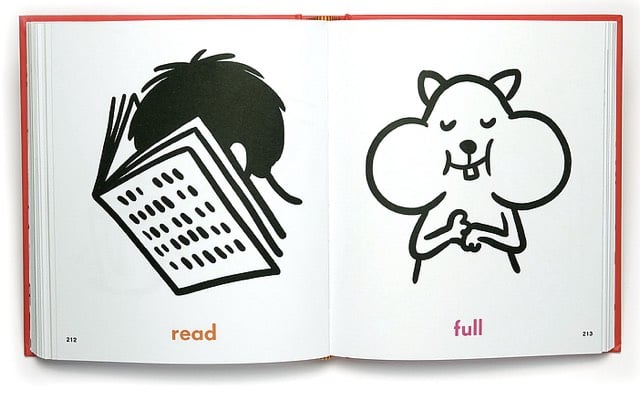This is much more satisfying than browsing Google Trends, and just as illuminating about cultural shifts. Merriam-Webster’s new Time Traveler surfaces words based on the year they were first introduced in print*.
Apparently I was born the same year as the high five, ecofeminism, air guitar, voice mail, gridlock, heavy lifting, and gazillionaire.
My alma mater was founded in the same year as the words capitalism, Chianti, sassy, pants, pseudoclassic, tragic irony, mauve, and, my personal favorite, somnambulate.
*An important note on First Known Use dates:
The date most often does not mark the very first time that the word was used in English. Many words were in spoken use for decades or even longer before they passed into the written language. The date is for the earliest written or printed use that the editors have been able to discover.

Ace illustrator Christoph Niemann has a new book coming out called Words, an illustrated compilation of 300+ sight words
What can you do with a word? Read it, spell it, say it, picture it, understand it, make a sentence with it, tell a story with it, share it with a friend. Everything starts with a love of words! More than 300 words inspired by Dr. Edward Fry’s list of sight words are paired with striking and playful illustrations by internationally renowned designer and artist Christoph Niemann to deepen understanding, to enrich, and to enlighten those learning to read and write English, whether they be children or adults.
Flavorwire has a post on the etymology of 10 musical genre names. This is the type of thing that you wonder about from time to time, but probably never bothered to look up.
Punk: While “punk” was once (and still, occasionally) catch-all slang for a young delinquent, “punk rock” first appeared in a 1970 Chicago Tribune article, uttered by Ed Sanders of The Fugs. Although the band was one of punk’s immediate ancestors, Sanders went on to define the term as “redneck sentimentality.” The next year, Dave Marsh of Creem used “punk rock” to describe ? and the Mysterians. Its meaning evolved from there, originally encompassing a slew of Nuggets-era garage-rock bands and eventually solidifying into a more rigid description of the mid-’70s bands we think of as “punk.”
(Via @tcarmody and @brainpicker)
The ancient Roman vomitorium, or vomitoria, were supposedly places where diners could go and void their stomachs during a meal, in order to make room for more delicacies. There are even detailed descriptions of the rooms, stating that they had large slabs or pillars to lean over that would better facilitate voiding the stomach. Though it might come as a disappointment to preteen boys studying Latin, the vomitorium of such lore is a myth. A true vomitoria is actually a well-designed passage within an ampitheater that allowed large numbers of Romans to file in and out of large spaces quickly. The root of the word, vomere, translates to “spew out,” which makes sense when applied to hurried exits.
Joe MacLeod, America’s best newspaper columnist, takes the art of phoning-it-in to dizzying new heights in today’s Baltimore City Paper:
Hey! It’s time to run a whole year of my every-other-weekly “column” through the “AutoSummarize” tool on Microsoft Word. This year it’s 20,684 words, boiled down to 4 percent of original size. Fun!






Stay Connected